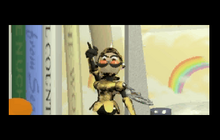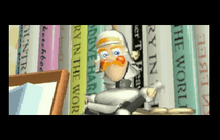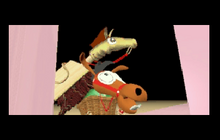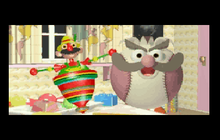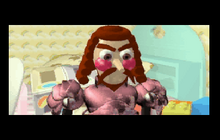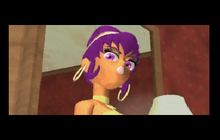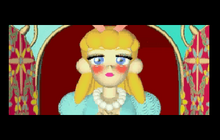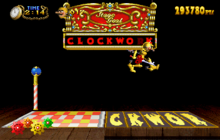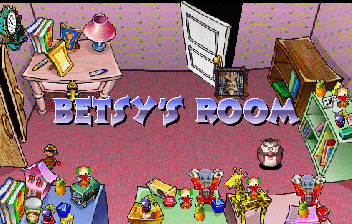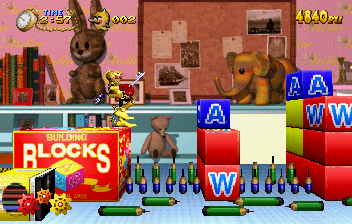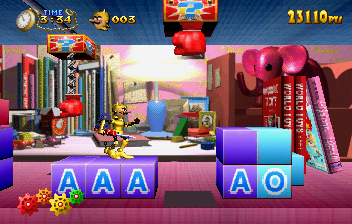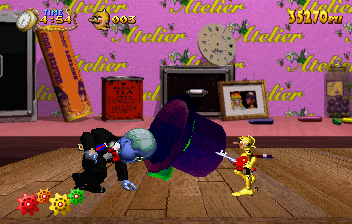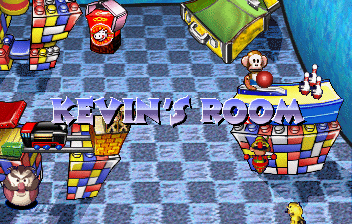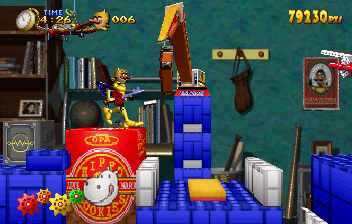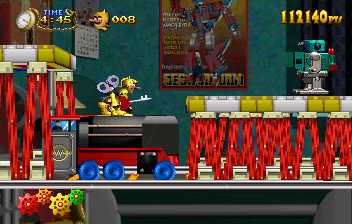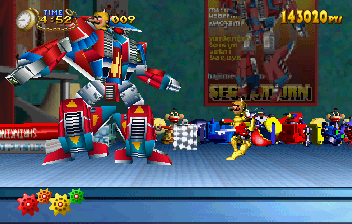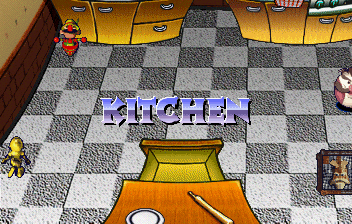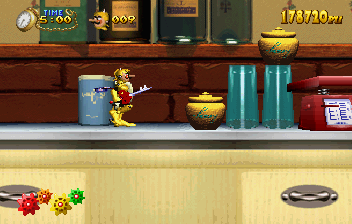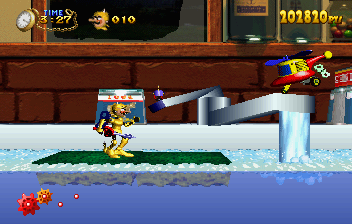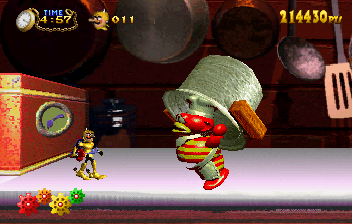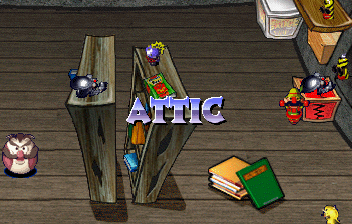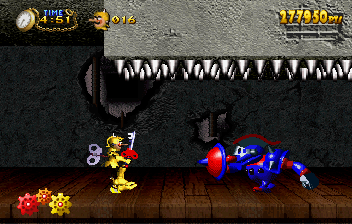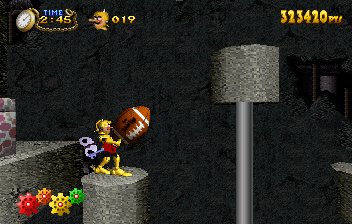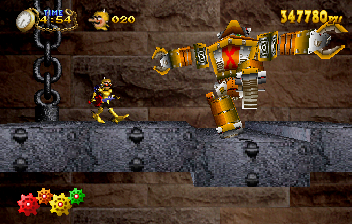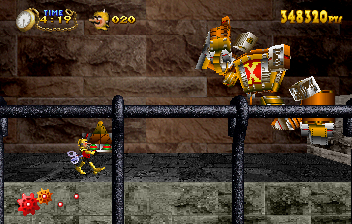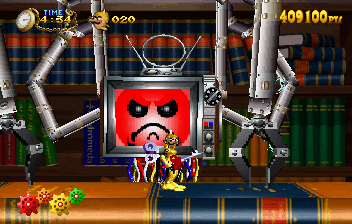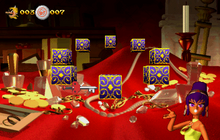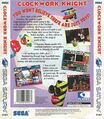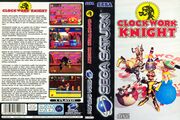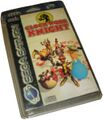Clockwork Knight
From Sega Retro
| Clockwork Knight | ||||||||||||||||||||||||||||||||||||||||||||||||||
|---|---|---|---|---|---|---|---|---|---|---|---|---|---|---|---|---|---|---|---|---|---|---|---|---|---|---|---|---|---|---|---|---|---|---|---|---|---|---|---|---|---|---|---|---|---|---|---|---|---|---|
| System(s): Sega Saturn | ||||||||||||||||||||||||||||||||||||||||||||||||||
| Publisher: Sega | ||||||||||||||||||||||||||||||||||||||||||||||||||
| Developer: Team Aquila, Sega CS1,[1] Sega CS2[2] | ||||||||||||||||||||||||||||||||||||||||||||||||||
| Supporting companies: Sega Digital Media[3] (audio) | ||||||||||||||||||||||||||||||||||||||||||||||||||
| Distributor: Tec Toy (BR) | ||||||||||||||||||||||||||||||||||||||||||||||||||
| Sound driver: SCSP/CD-DA (2 tracks) | ||||||||||||||||||||||||||||||||||||||||||||||||||
| Genre: Action[4][5] | ||||||||||||||||||||||||||||||||||||||||||||||||||
| Number of players: 1 | ||||||||||||||||||||||||||||||||||||||||||||||||||
|
Clockwork Knight, known as Clockwork Knight: Pepperouchau no Daibouken Joukan (クロックワークナイト ペパルーチョの大冒険・上巻) in Japan, is a side-scrolling "2.5D" platform game, released as a launch title for the Sega Saturn in all major territories.
Contents
Story
Sir Tongara de Pepperouchau III ("Pepper" for short) is a toy soldier. He is in love with the Clockwork Fairy Princess, Chelsea, whose voice wakes up the toys of the house every night at midnight. But he is clumsy and something of a laughingstock, especially compared to his friendly rival Ginger, who is also after Chelsea's heart.
One night, Chelsea is stolen away by an unknown force, which also hypnotizes some of the lesser toys to become fierce minions and stand in the way of anyone who would try to rescue her. If there is no voice to wake them up anymore, then the toys will never live again, so Pepper and Ginger head off to find Chelsea before it is too late.
Characters
Gameplay
This game is a side-scrolling platformer played as the toy soldier Sir Pepperouchau. It uses digitized 2D sprites of prerendered 3D models (similar to the Donkey Kong Country series) on top of fully 3D levels. Objects in the background layer sometimes interact with the foreground, such as enemies jumping in or objects falling forward. Levels take place in rooms full of toys and other household objects, similar to the later Toy Story. The goal of each level is to reach the end of the stage before time runs out. The levels are fairly large and contain numerous side areas with treasures. Each room has two levels followed by a fight against a large, fully polygonal boss (which all have a different weakness that must be exploited).
Pepper walks with ![]() or
or ![]() and sprints with
and sprints with ![]()
![]() or
or ![]()
![]() . Some objects can be pushed by moving into them. He crouches with
. Some objects can be pushed by moving into them. He crouches with ![]() . He jumps with
. He jumps with ![]() or
or ![]() and jumps higher if the button is held for longer. He jumps farther while running. Pepper attacks enemies by using a wind-up key like a sword; he thrusts the key ahead by tapping
and jumps higher if the button is held for longer. He jumps farther while running. Pepper attacks enemies by using a wind-up key like a sword; he thrusts the key ahead by tapping ![]() . Many enemies require multiple stabs to defeat (causing them to pop into a burst of confetti). The first stab stuns the enemy, rendering them harmless for a duration. Pepper can pick up stunned enemies or other small objects (such as footballs or springs) that are scattered around the levels by holding
. Many enemies require multiple stabs to defeat (causing them to pop into a burst of confetti). The first stab stuns the enemy, rendering them harmless for a duration. Pepper can pick up stunned enemies or other small objects (such as footballs or springs) that are scattered around the levels by holding ![]() when next to them. He can throw an object he is carrying by releasing
when next to them. He can throw an object he is carrying by releasing ![]() ; objects can be thrown upward with
; objects can be thrown upward with ![]() +
+![]() or set down with
or set down with ![]() +
+![]() . He can move while holding an object. Stunned enemies awaken after a duration, which damages Pepper if he is holding them. Pepper can use his key to interact with some objects in levels, such as opening boxes. Pepper can twist his key around with
. He can move while holding an object. Stunned enemies awaken after a duration, which damages Pepper if he is holding them. Pepper can use his key to interact with some objects in levels, such as opening boxes. Pepper can twist his key around with ![]()
![]()
![]()
![]()
![]() , which is more powerful and can defeat most enemies with a single touch.
, which is more powerful and can defeat most enemies with a single touch.
Pepper starts the game with three hit points, depicted as gears in the lower-left corner of the screen. He loses a hit point each time he takes damage from an enemy or hazard, and he loses a try if time or hit points run out. There are no checkpoints, so losing a try sends a player back to the beginning of a level. Leaping onto the missing letter in "CLOCKWORK" on the goal at the end of the level awards an extra life. The game ends if the player runs out of lives but can be continued at the cost of 20 Imperial Crowns (collectables that are found throughout the game). The player can set the difficulty level (Training, Normal, and Hard) and number of starting lives from the options before starting the game. The final boss fight can only be played on Normal or Hard difficulty.
Items
Items can be collected by walking over them or poking them with Pepper's wind-up key.
| Imperial Crown | |
|---|---|
| A bottle cap with a picture of a crown on it. These can be wagered in the Soltian Roulette bonus game or spent to continue the game if lost. | |
| Pocket Watch | |
| A pocket watch that is scattered around almost as much as Imperial Crowns. Awards either one or five bonus seconds on the timer. | |
| Keys | |
| Wind-up keys that restore a hit point. Bronze Keys refill one point, Silver Keys refill all points, and Gold Keys refill all points and increase the maximum by one (up to four hit points total for the current try). If Pepper is already at full health with five hit points, the Gold Key awards an extra life. | |
| Helmets | |
| A blue helmet (Oneon's Helmet) awards an extra life. The much-rarer red helmet (Garluch's Helmet) awards three extra lives. | |
| Pa-Zur Sphere | |
| Makes Pepper invincible for a short time. |
Rooms
This game has thirteen levels: four different rooms with two normal levels and one boss each, plus a final boss.
Bonus game
After finishing the boss level of the first three rooms, the player can play a bonus game with Soltia, Prunchau, and Le Bon. The player bets Imperial Crowns on the likelihood of getting something from a roulette of various things (including bonus items such as Imperial Crowns, 1-Ups, 3-Ups or clown heads, which award nothing). After betting 5, 10, or 15 Imperial Crowns, the boxes reveal their contents (the amount of everything varies depending on how much the player bets), then go for a quick spin. After the boxes come to a rest, the player chooses a box. If the player picks a box with a prize in it, it can be kept, or the player can choose to spin again for a double-or-nothing round. This can be done up to four times, with the amount of doubles going down by one each time.
History
Development

Clockwork Knight is one of Sega's first significant forays into rendering 3D imagery on a computer, being created with Silicon Graphics workstations running Softimage. While the Super NES game Donkey Kong Country is usually credited for being the first big-budget title to take advantage of this technique, Clockwork Knight was just a few weeks behind in Japan.
While it can never be proven, it is likely that Clockwork Knight was inspired by the works of John Lasseter and Pixar, who had been producing groundbreaking computer animated shorts, usually based on normally-inanimate objects, since the mid-1980s. In 1988, Pixar released Tin Toy, a five-minute short featuring sentient toys (which later became a catalyst for Toy Story in 1995). A seemingly common misconception is that Clockwork Knight was either inspired by or ripped off Toy Story, but the similar ideas seen in Clockwork Knight beat Toy Story to market by almost a year in Japan (and by several months in the US and Europe), though the former was far less of an influence in popular culture than the latter. Like Pixar, Sega likely realised that computers of the era was more suited to rendering simple geometric shapes made of plastic or metal, rather than realistic organisms such as animals or humans.
In a funny twist to the above, it came out in a June 2018 video from GameHut's Jon Burton (head of Traveller's Tales) where he discussed the tricks used to create the 3D depth effect in the platforming levels for the Sega Genesis Toy Story game (for which he was the lead programmer), that he had at the time been playing Clockwork Knight on the then new Sega Saturn and was inspired by the depth perception used in the game to try and recreate the effect on the ageing 16-bit hardware of the Sega Genesis for the Toy Story game.[10]
Clockwork Knight was one of the first Sega Saturn games to be announced, being first shown to the public under the working title of Action Game at Winter CES 1994. At the time, the Saturn console had not been finalised, and the Clockwork Knight demonstration consisted solely of a jerky, prerendered 3D video demonstrating concepts that might appear in the game. The video demonstrates Pepper running, jumping and picking up objects, but it also includes a sequence where the character pushes a stack of tins off the edge of a shelf, pushes a floor switch, and fights a jack-in-the-box with a small, red umbrella rather than his "key sword" in the final game.
While only brief, this fight is more involved than anything seen in the final product. Pepper is seen blocking and kicking, as opposed to the enemy exploding when hit once. There is no known accompanying sound to any of the footage, and the world Pepper inhabits is far more subdued than the vibrant kids rooms seen in the final game. This video was included as a bonus in Clockwork Knight: Pepperouchau no Fukubukuro and the US release of Clockwork Knight 2.
Clockwork Knight was intentionally made harder for the US and European markets, because it was believed American consumers preferred tougher games than their Japanese counterparts (and Europeans tougher still)[11]. Other changes were also put in place: increasing the entry fees to play Soltian Roulette, removing before-level cutscenes featuring Pepper's friends who give him tips, and changing the skin color of the first boss (Dandy Bob) from white to blue out of concern that Western audiences would misinterpret the fight as a toy attacking a child.[12]
Legacy
It is not known if the Clockwork Knight story was always meant to span two games. However, by releasing the game in Japan as Clockwork Knight: Pepperouchau no Daibouken Joukan ("Joukan" literally translating to "first volume"), a sequel was expected, and arrived the following year as Clockwork Knight 2. Clockwork Knight 2 is often seen as a refined version of the first game: the gameplay remains almost identical and many of the graphics and audio cues were not changed.
The two were later compiled into one release, Clockwork Knight: Pepperouchau no Fukubukuro in Japan, becoming the definitive version of Clockwork Knight, although this version does have some unexplained missing content.
Versions
Localised names
| Language | Localised Name | English Translation |
|---|---|---|
| English | Clockwork Knight | Clockwork Knight |
| English (US) | Clockwork Knight | Clockwork Knight |
| Japanese | クロックワークナイト ペパルーチョの大冒険・上巻 | Clockwork Knight: Pepperouchau no Daibouken Joukan |
Production credits
- Main article: Clockwork Knight/Production credits.
Soundtrack
A soundtrack album, Clockwork Knight: Pepperouchau no Daibouken Fantastic Soundtrack, was released exclusively in Japan two days before the Japanese release of the second game.
Magazine articles
- Main article: Clockwork Knight/Magazine articles.
Promotional material
Physical scans
| ExpandSega Retro Average |
|---|
| 74 | |
|---|---|
| Based on 50 reviews | |
| Saturn, PT |
|---|
|
Technical information
- Main article: Clockwork Knight/Technical information.
External links
References
- ↑ Credits CS1 producer Yoji Ishii
- ↑ Credits CS2 producer Makoto Oshitani
- ↑ http://www.wave-master.com/wm/works/index.html (Wayback Machine: 2004-05-19 20:54)
- ↑ File:Clockwork sat jp backcover.jpg
- ↑ Jump up to: 5.0 5.1 https://sega.jp/history/hard/segasaturn/software.html (Wayback Machine: 2020-03-04 08:13)
- ↑ Press release: 1995-05-19: Sega Saturn launch takes consumers and retailers by storm
- ↑ Jump up to: 7.0 7.1 GamePro, "August 1995" (US; 1995-xx-xx), page 54
- ↑ Jump up to: 8.0 8.1 Games World: The Magazine, "September 1995" (UK; 1995-0x-xx), page 69
- ↑ Jump up to: 9.0 9.1 Sega Magazine, "August 1995" (UK; 1995-07-13), page 60
- ↑ | GameHut Video where Jon Burton explains the influence of Clockwork Knight on the Toy Story Sega Genesis game at 0:23
- ↑ GamePro, "January 1996" (US; 199x-xx-xx), page 49
- ↑ https://segaretro.org/Clockwork_Knight/Comparisons#First_Room_Boss_.28Dandy_Bob.29_Differences_by_Region
- ↑ 1700 igr dlya Sega, "" (RU; 2001-xx-xx), page 48
- ↑ Alaab Alcomputtar, "" (SA; 1995-08-xx), page 74
- ↑ CD Consoles, "Février 1995" (FR; 1995-xx-xx), page 120
- ↑ Consoles +, "Février 1995" (FR; 1995-0x-xx), page 118
- ↑ Computer & Video Games, "February 1995" (UK; 1995-01-15), page 28
- ↑ Digitiser (UK) (1995-07-11)
- ↑ Edge, "March 1995" (UK; 1995-01-26), page 72
- ↑ Electronic Entertainment, "August 1995" (US; 1995-0x-xx), page 77
- ↑ Electronic Gaming Monthly, "July 1995" (US; 1995-0x-xx), page 38
- ↑ Excalibur, "" (CZ; 1995-08-01), page 1
- ↑ Famitsu, "1994-12-30" (JP; 1994-12-16), page 1
- ↑ GameFan, "Volume 3, Issue 7: July 1995" (US; 1995-xx-xx), page 13
- ↑ Game Players, "Vol. 8 No. 8 August 1995" (US; 1995-0x-xx), page 36
- ↑ GamePro, "April 1995" (US; 1995-xx-xx), page 144
- ↑ Hobby Consolas, "Agosto 1995" (ES; 1995-xx-xx), page 98
- ↑ Joypad, "Décembre 1994" (FR; 1994-1x-xx), page 162
- ↑ Joypad, "Septembre 1995" (FR; 1995-0x-xx), page 70
- ↑ LeveL, "Červen 1995" (CZ; 1995-06-01), page 36
- ↑ MAN!AC, "02/95" (DE; 1995-01-11), page 26
- ↑ MAN!AC, "08/95" (DE; 1995-07-12), page 46
- ↑ Maximum, "October 1995" (UK; 1995-09-01), page 145
- ↑ Mega, "April 1995" (UK; 1995-03-30), page 18
- ↑ Mega Force, "Janvier 1995" (FR; 199x-xx-xx), page 52
- ↑ Mega Fun, "08/95" (DE; 1995-07-19), page 83
- ↑ Mean Machines Sega, "February 1995" (UK; 1994-12-30), page 84
- ↑ Mean Machines Sega, "October 1995" (UK; 1995-08-25), page 90
- ↑ Next Generation, "April 1995" (US; 1995-03-21), page 89
- ↑ Player One, "Juillet/Août 1995" (FR; 1995-0x-xx), page 64
- ↑ Power Unlimited, "Jaagang 3, Jul/Aug 1995" (NL; 1995-06-28), page 38
- ↑ Saturn Fan, "1995 March" (JP; 1995-02-08), page 40
- ↑ Saturn+, "Christmas 1995" (UK; 1995-12-14), page 56
- ↑ Score, "Květen 1995" (CZ; 1995-05-01), page 30
- ↑ Sega Magazin, "August 1995" (DE; 1995-07-12), page 65
- ↑ Sega Power, "April 1995" (UK; 1995-02-16), page 63
- ↑ Sega Pro, "March 1995" (UK; 1995-01-26), page 34
- ↑ Sega Pro, "September 1995" (UK; 1995-08-10), page 50
- ↑ Sega Megazone, "August 1995" (AU; 1995-0x-xx), page 24
- ↑ Sega Saturn Magazine, "Readers rating final data" (JP; 2000-03), page 14
- ↑ Super Juegos, "Agosto 1995" (ES; 1995-0x-xx), page 82
- ↑ Todo Sega, "Septiembre 1995" (ES; 1995-0x-xx), page 36
- ↑ Tricks 16 bit, "Tricks Sega Gold 800 igr" (RU; 1998-03-20), page 44
- ↑ Ultimate Future Games, "September 1995" (UK; 1995-08-01), page 89
- ↑ Ultimate Future Games, "March 1995" (UK; 1995-02-03), page 82
- ↑ Ultimate Gamer, "July 1995" (US; 1995-0x-xx), page 89
- ↑ Última Generación, "Abril 1995" (ES; 1995-0x-xx), page 78
- ↑ Video Games, "8/95" (DE; 1995-07-26), page 67
- ↑ VideoGames, "June 1995" (US; 1995-0x-xx), page 72
| CollapseClockwork Knight | |
|---|---|
|
Main page | Comparisons | Credits | Hidden content | Magazine articles | Video coverage | Reception | Technical information
Music: Clockwork Knight: Pepperouchau no Daibouken Fantastic Soundtrack (1995)
Demos: Clockwork Knight Sample (1994)
Prototypes: 1995-02-06
| |
| CollapseClockwork Knight series of games | |
|---|---|
| Clockwork Knight (1994) | Clockwork Knight 2 (1995) | Clockwork Knight: Pepperouchau no Fukubukuro (1995) | Clockwork Knight: Pengin War (Cancelled) | |
| Knight'n Knight (Cancelled) | |
| Sampler Discs | |
| Clockwork Knight Sample (1994) | Prime Selection Vol. 1 (1995) | |
| Clockwork Knight related media | |
| Clockwork Knight: Pepperouchau no Daibouken Fantastic Soundtrack (1995) | Israelites (1996) | |
| Clockwork Knight: Pepperouchau no Daibouken (1994) | Clockwork Knight: Pepperouchau no Daibouken Joukan Koushiki Guide Book (1995) | Clockwork Knight: Pepperouchau no Daibouken Gekan Koushiki Guide Book (1995) | |
- 1 player games
- JP Saturn games
- All JP games
- US Saturn games
- All US games
- EU Saturn games
- All EU games
- DE Saturn games
- All DE games
- PT Saturn games
- All PT games
- UK Saturn games
- All UK games
- PL Saturn games
- All PL games
- AU Saturn games
- All AU games
- BR Saturn games
- All BR games
- Saturn games
- 1994 Saturn games
- All 1994 games
- Saturn action games
- All action games
- Saturn games with Cinepak video
- Saturn games using the Sega Sound Library
- All games
- Bad external reference
- Bad translation
- Old-style rating (famitsu r)
- Rating without PDF source
- Update ratings template
- 1 old ratings
- Clockwork Knight
- Clockwork Knight (franchise)

